Late Summer Championships 2022

There was close competition in the Optimist, Topper, ILCA, 420, Feva, Techno and IQ Foil classes, alongside a super fun regatta fleet for junior Optimist and Topper sailors run by a team of race coaches.
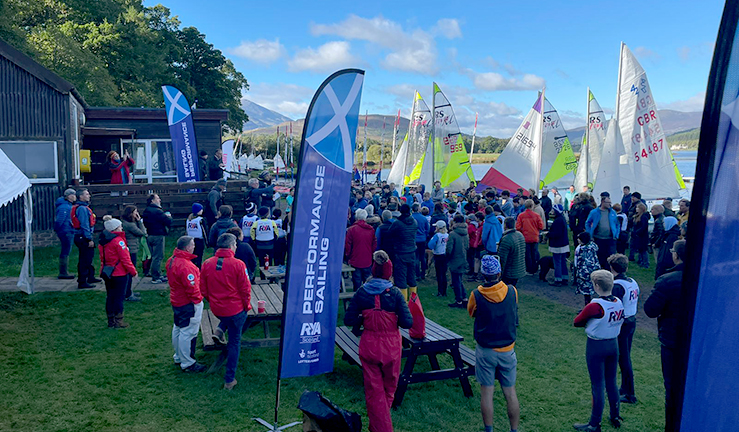
The event brought together sailors from all the pathway classes with different goals for the weekend, from first time foiling or racing to those experienced sailors looking for the class win.
The contrast from a light Northerly wind across the Loch on Saturday to the building westerly on Sunday gave the fleet a mix of conditions to use their sailing skills to get round the courses.
Race director Robin Nicol said. “It has been an interesting weekend with next to no wind on Saturday, with fluky 180 degree shifts. Whereas Sunday had a 20 Knot forecast and we definitely got 20 knots. Lots of activity, lots of racing and overall very, very good to see everyone out on the water.”

Alpha Course consisted of four classifications with some dominant performances by Andrew Perratt in the Optimist Class and Ben Homer in the Topper fleet.
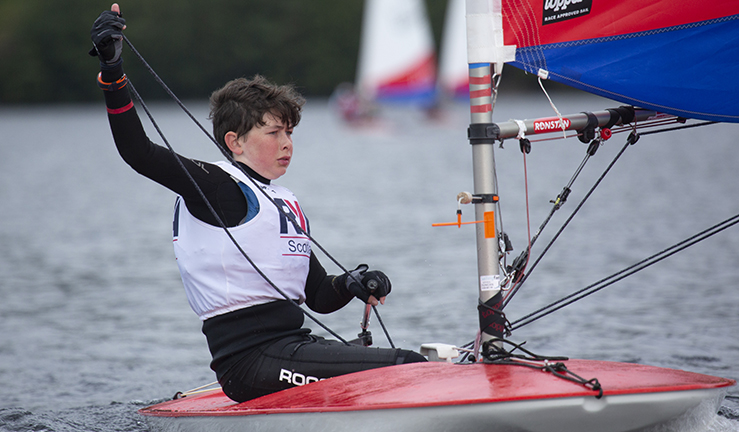
The ILCA’s had some close racing with Roo Purvis securing 3 race wins over the weekend to lead the class. It was also good to see the kite handling in the 420’s in Sunday’s breezy conditions, with Findlay Davidson and Gregor Thomas keeping ahead throughout.
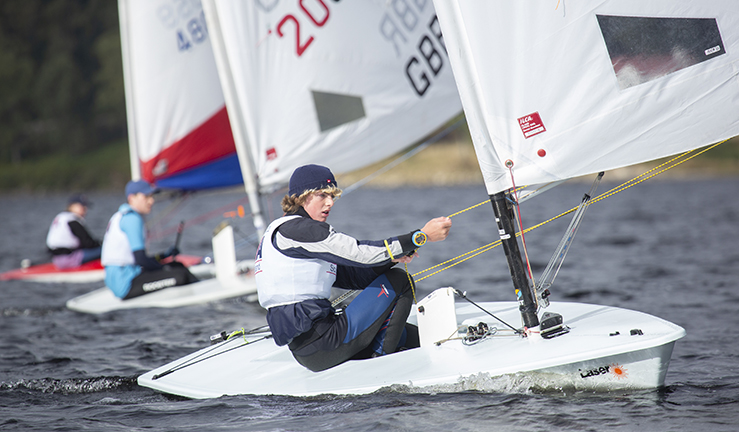
ILCA sailor Roo Purvis from East Lothian Yacht Club said.
“It was kinda of shifty and funky racing, with a few funny downwinds where I lost or gained places. Great venue when the winds are from the ends of the loch, but when the wind comes across the loch it was a lot trickier. I managed to stay consistent and win overall. I really enjoy the racing, particularly happy when I am winning.”
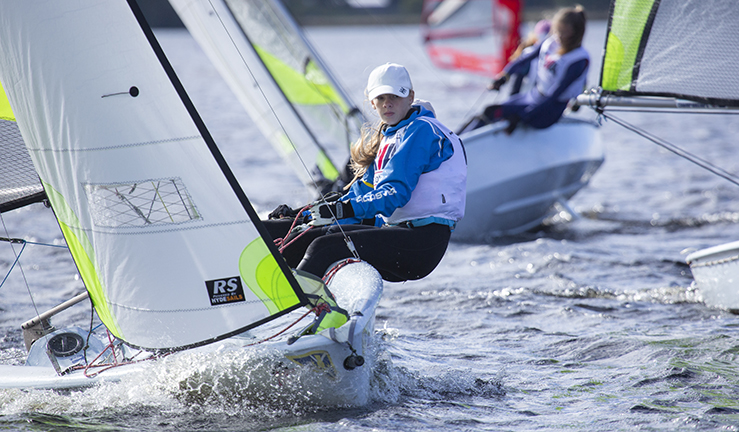
Bravo course hosted the doubled handed Fevas, who were predominately female sailors this year, with sisters Ellie and Georgia MacCalman taking the overall win, after some exciting conditions and getting to share the course with the windsurfing fleets.
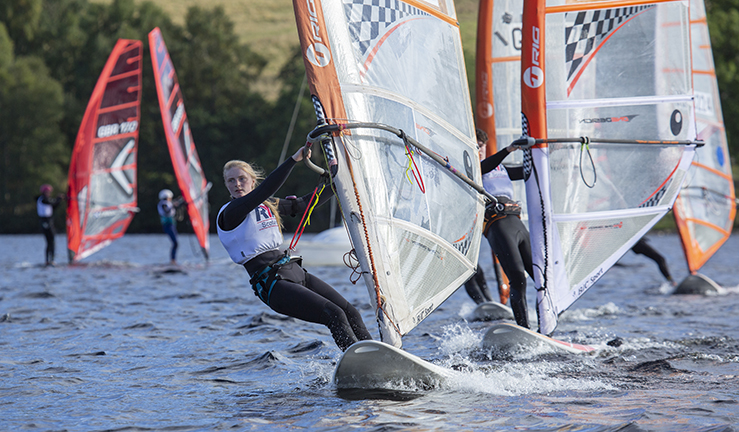
The windsurfers on the Techno 293 and the impressive Youth IQ Foil fleet certainly enjoyed the breezy conditions as they flew around the course. Finlay Cooper and Ellen Phillips had the largest share of race winds over the 8 race series, with Finlay finishing on 11 points to take the victory.

The IQ Foil Class had some superb racing in the breeze with the race team getting the closest views as the fleet pulled the trigger up onto the foils into the starts. Three boards were unable to join on the Saturday, although only 3 points separated the podium positions after the 6 races. Dylan Galloway held on the most consistent performance, leading Dan McGregor and Euan Lindsay.
Nearer the clubhouse the Junior Regatta fleets of Optimist and Toppers were kept highly entertained by the coaching team, with 5 races in amongst games ashore and afloat that all aimed to improve sailing skills on a race course.

Kian Sterritt, who led the coaching in the regatta fleet noted.
“The sailors did amazing and at one point we had event more races under our belt than the championship fleet. It was great seeing the sailors highlight some of the British Youth Sailing Values, like determination as the wind picked up or teamwork, which we saw lots of and ambition to do as well as they could on the water. We also had some fun activities ashore to reinforce those values and everybody seemed to really enjoy the weekend.”
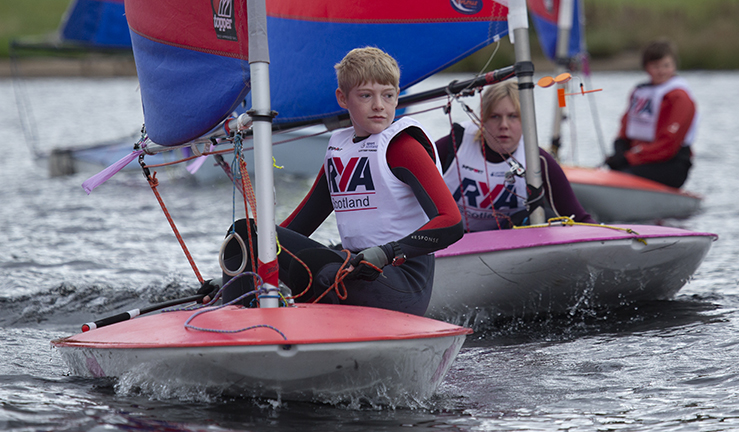
Optimist sailor, Josh Misra (13), from Aberdeen and Stonehaven Sailing Club added.
“It’s really fun. You can be neck and neck with someone and you can either push through or just stop. I like the racing side and I’ve met some amazing people through my club and at this event.”
Local Loch Tummel Sailor Maisie MacIntyre (10) said. “Sometimes it’s scary when it really windy, but great fun when the wind is a bit lighter. The best bit is we control our own boat and we can go anywhere we chose, which is cool.”
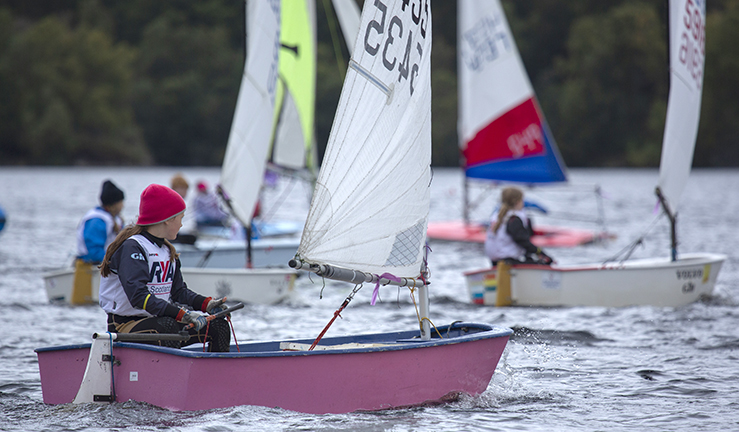
RYA Scotland Chair, Brian Wilson spent the weekend at the event meeting sailors, their families and volunteers at the event and noted.
“It was fantastic to see so young sailors taking part in this event from all over the country. The volunteers at Loch Tummel have been extremely accommodating alongside the parents who have assisting in the volunteer roles on the race team to ensure the best possible racing for these aspiring sailors. A massive thank you, really top job. We are now focussed on helping these sailors throughout the winter training block of Academies and Performance Teams as they strive for their different goals in whatever class they are sailing and whatever stage in their racing journey.”
Full results for the event are available here.
For further information about the Academy training over the winter please visit here.
